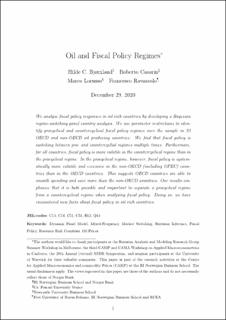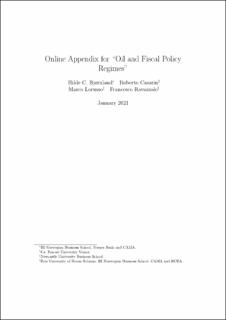| dc.contributor.author | Bjørnland, Hilde Christiane | |
| dc.contributor.author | Casarin, Roberto | |
| dc.contributor.author | Lorusso, Marco | |
| dc.contributor.author | Ravazzolo, Francesco | |
| dc.date.accessioned | 2021-01-12T14:22:08Z | |
| dc.date.available | 2021-01-12T14:22:08Z | |
| dc.date.issued | 2020-12-29 | |
| dc.identifier.issn | 1892-2198 | |
| dc.identifier.uri | https://hdl.handle.net/11250/2722610 | |
| dc.description.abstract | We analyse fiscal policy responses in oil rich countries by developing a Bayesian regime-switching panel country analysis. We use parameter restrictions to identify procyclical and countercyclical fiscal policy regimes over the sample in 23 OECD and non-OECD oil producing countries. We find that fiscal policy is switching between pro- and countercyclial regimes multiple times. Furthermore, for all countries, fiscal policy is more volatile in the countercyclical regime than in the procyclical regime. In the procyclical regime, however, fiscal policy is systematically more volatile and excessive in the non-OECD (including OPEC) countries than in the OECD countries. This suggests OECD countries are able to smooth spending and save more than the non-OECD countries. Our results emphasize that it is both possible and important to separate a procyclical regime from a countercyclical regime when analysing fiscal policy. Doing so, we have encountered new facts about fiscal policy in oil rich countries. | en_US |
| dc.language.iso | eng | en_US |
| dc.publisher | BI Norwegian Business School | en_US |
| dc.relation.ispartofseries | CAMP Working Paper Series;11 | |
| dc.subject | Dynamic Panel Model | en_US |
| dc.subject | Mixed-Frequency | en_US |
| dc.subject | Markov Switching | en_US |
| dc.subject | Bayesian Inference | en_US |
| dc.subject | Fiscal Policy | en_US |
| dc.subject | Resource Rich Countries | en_US |
| dc.subject | Oil Prices | en_US |
| dc.title | Oil and Fiscal Policy Regimes | en_US |
| dc.type | Working paper | en_US |
| dc.source.pagenumber | 40 | en_US |

